Protección social
El informe sobre el Estado Global de los Programas de Transferencias Monetarias 2020 de la CALP Network muestra lo siguiente:
- Trabajar con, a través de y junto con los sistemas de protección social es ahora considerado esencial para fortalecer el nexo entre la ayuda humanitaria y el desarrollo. Los actores humanitarios son cada vez más activos en este espacio.
- Los profesionales encuentran que los tres grandes desafíos para la vinculación eficaz son los siguientes: (i) la falta de coordinación entre los actores involucrados, (ii) los sistemas de protección social no están diseñados para responder a las crisis humanitarias, (iii) los profesionales carecen de experiencia en la protección social.
- Fundamentalmente, no existe una solución de “talla única” para la vinculación de los PTM y la protección social. Se deben considerar compensaciones entre la eficiencia, la eficacia, la rendición de cuentas y la sostenibilidad para asegurar los mejores resultados para las personas que viven en situaciones de crisis, y esto depende del contexto, los sistemas existentes y los plazos. La vinculación no siempre será apropiada y los sistemas de protección social podrían no satisfacer todas las necesidades. En muchos contextos, en el corto a mediano plazo, al menos, la programación humanitaria será requerida para llenar los vacíos.
Prioridades actuales
La CALP Network ha invertido intensamente en esta área temática durante el último año. Continuaremos trabajando estrechamente con el subgrupo de trabajo del Gran Pacto en Protección Social y con el equipo de la plataforma de “Protección social en contextos de crisis” de socialprotection.org para desarrollar evidencia, producir materiales de aprendizaje y brindar apoyo técnico para los actores de coordinación.
Lectura adicional
-
El vínculo entre la protección social y los programas de transferencias monetarias (PTM) - Resumen de alto nivel, la CALP Network, 2020 (en inglés)
-
El vínculo entre la protección social y los PTM en la acción humanitaria
-
El vínculo entre la protección social y los PTM – ¿Qué sabemos realmente y por dónde empezamos? Hallazgos del documento informativo de alto nivel en tiempos de Covid-19 encargado por la CALP Network (en inglés)
-
El vínculo entre PTM y protección social en la region de Oriente Medio y Norte de África (MENA) – Hoja de repaso (en inglés)
-
El vínculo entre PTM y protección social en la region de Oriente Medio y Norte de África (MENA) – Caso de estudio del Líbano (en inglés)
-
El vínculo entre PTM y protección social en la region de Oriente Medio y Norte de África (MENA) – Caso de estudio de Iraq (en inglés)
-
El vínculo entre PTM y protección social en la region de Oriente Medio y Norte de África (MENA) – Caso de estudio de Yemen (en inglés)
-
El Estado de los Programas de Transferencias Monetarias 2020 – Capítulo 8: Vinculando los PTM y la protección social (en inglés)
Featured content

Linking CVA and Social Protection in the MENA Region – Crib sheet
Report
Building linkages between humanitarian cash and voucher assistance (CVA) and social protection (SP) has become an increasingly prominent topic over the past five years and the Middle East and North Africa (MENA) region has been at the centre of this evolution. The objective of this resource set (the crib sheet and 3, soon to be 6, regional case studies) is to ensure that the CALP Network...
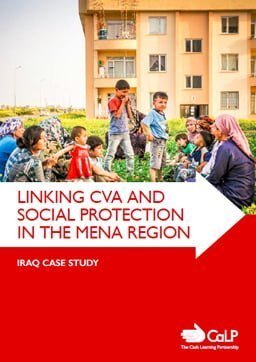
Linking CVA and Social Protection in the MENA Region – Iraq Case Study
Report
Building linkages between humanitarian cash and voucher assistance (CVA) and social protection (SP) has become an increasingly prominent topic over the past five years and the Middle East and North Africa (MENA) region has been at the centre of this evolution. The objective of this resource set (the crib sheet and 3, soon to be 6, regional case studies) is to ensure that the CALP Network...

Linking CVA and Social Protection in the MENA Region – Lebanon Case Study
Report
Building linkages between humanitarian cash and voucher assistance (CVA) and social protection (SP) has become an increasingly prominent topic over the past five years and the Middle East and North Africa (MENA) region has been at the centre of this evolution. The objective of this resource set (the crib sheet and 3, soon to be 6, regional case studies) is to ensure that the CALP Network...
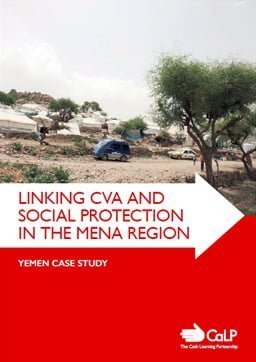
Linking CVA and Social Protection in the MENA Region – Yemen Case Study
Case Study
Building linkages between humanitarian cash and voucher assistance (CVA) and social protection (SP) has become an increasingly prominent topic over the past five years and the Middle East and North Africa (MENA) region has been at the centre of this evolution. The objective of this resource set (the crib sheet and 3, soon to be 6, regional case studies) is to ensure that the CALP Network...

Linking Cash and Voucher Assistance (CVA) and Social Protection – Occupied Palestinian Territories (OPT): Country Summary
Report
This country summary is part of a larger resource set, providing practitioners with examples of different approaches to linking CVA
and social protection.
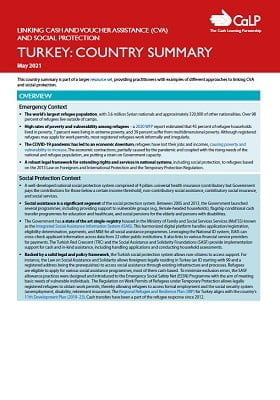
Linking Cash and Voucher Assistance (CVA) and Social Protection – Turkey: Country Summary
Report
This country summary is part of a larger resource set, providing practitioners with examples of different approaches to linking CVA
and social protection.
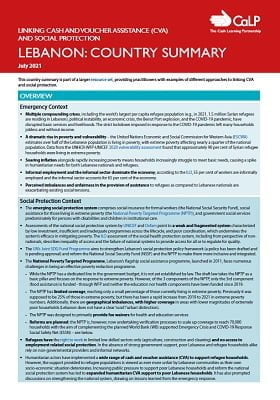
Linking Cash and Voucher Assistance (CVA) and Social Protection – Lebanon: Country Summary
Report
This country summary is part of a larger resource set, providing practitioners with examples of different approaches to linking CVA
and social protection.
Líder temática
Últimos recursos

Social Accountability in the Delivery of Social Protection: Technical Guidance Note
Guidelines and Tools
How can citizens better hold social protection officials to account and ensure that they can understand their entitlements? Development Pathways’ research project on social accountability in social protection for the UK’s Department for International Development provides some answers. Social...

Social Protection and Humanitarian Response: What is the Scope for Integration?
Guidelines and Tools
Given the rise in humanitarian emergencies triggered by climate-related risks and conflict, often in contexts of chronic poverty and vulnerability, the international community is calling for the better integration of short-term humanitarian assistance and longer-term development interventions. In this...

Somalia Donor Working Group (DWG) – Safety Net Terms of Reference (ToR)
Guidelines and Tools
Large scale cash and voucher transfers have formed the basis of the humanitarian response to the 2016-18 drought (and threat of famine) in Somalia and successfully so. While sporadic small scale cash transfer projects in the past lacked coordination and coherence, this time a great deal of effort has been...

Terms of Reference – The Ethiopia Cash Working Group – November2017
Report
The Ethiopia Cash Working Group (ECWG) is a forum of stakeholders dedicated to improving the use and delivery of cash and voucher transfer programming in Ethiopia The overall objective of the group is to strengthen the coherence and quality of cash based interventions (CBIs) in Ethiopia through...
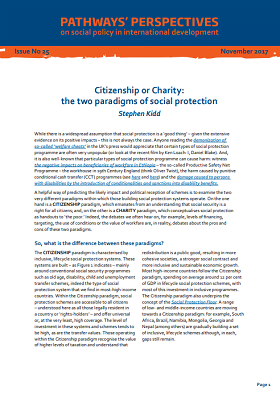
Citizenship or Charity: the two paradigms of social protection
Report
This report compares and evaluates two paradigms of social protection. Stephen Kidd explores the assumptions behind, and impacts of, the citizenship and charity paradigms he argues are at work in different contexts.

Final Evaluation of the DiRECT Response Emergency Cash Transfer Programme in Zambia
Report
In the past two years (2015 and 2016), Zambia experienced relatively harsh climatic conditions characterised by disruptive rains and the negative impact of El Nino weather patterns. Districts in the southern and western regions of the country were most affected. Many farmers in the affected regions were...
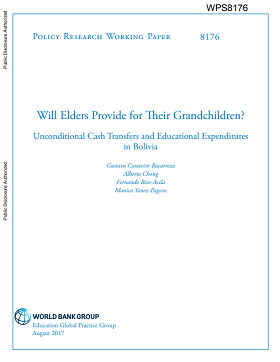
Will Elders Provide for Their Grandchildren? Unconditional Cash Transfers and Educational Expenditures in Bolivia
Report
This paper takes advantage of repeated cross-section household surveys and a sharp discontinuity created by the introduction of an unconditional cash transfers to elders.The paper evaluates the impact of these cash transfers on the educational expenditures for children within a household. The analysis...
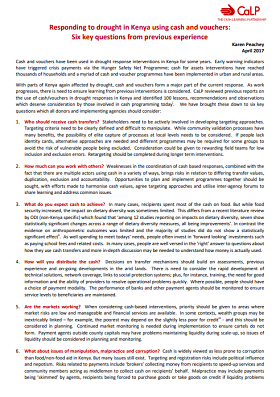
Responding to Drought in Kenya Using Cash and Vouchers: Six Key Questions from Previous Experience
Guidelines and Tools
the CALP Network reviewed previous reports on the use of cash/vouchers in drought responses in Kenya and identified 100 lessons, recommendations and observations which deserve consideration by those involved in cash programming today. We have brought these down to six key questions which all donors and...
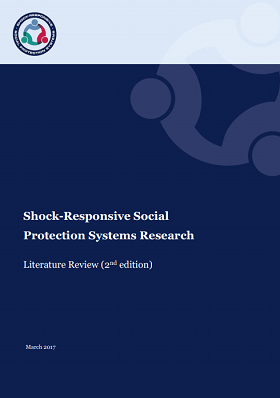
Shock-Responsive Social Protection Systems Research: Literature Review (2nd Edition)
Report
DFID has commissioned research into Shock-Responsive Social Protection systems, to further understand the nature of the interaction between social protection, humanitarian and disaster risk management systems and ways in which long-term social protection systems can be scaled up to provide support in...

A promise of tomorrow.The effects of UNHCR and UNICEF cash assistance on Syrian refugees in Jordan
Report
Despite the generous hosting by the Government and people of Jordan of Syrian refugees, more than 650,000 registered Syrian refugees in the country, continue to face a highly uncertain future. They cannot go home, given the ongoing conflict and insecurity in Syria; many of the most vulnerable struggle to...
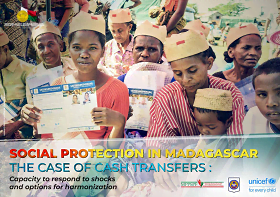
Social protection in Madagascar – The Case of Cash Transfers: Capacity to respond to shocks and options for harmonization
Report
The report has been prepared as commissioned by the Government of Madagascar (Ministry of Population, Social protection and Women’s Promotion and the National Office of Risk and Disaster Management) in coordination with the members of the emergency cash group and with UNICEF’s funding and technical...

Cash for Education: A global review of UNHCR programmes in refugee settings
Report
This review provides an overview of the use of cash assistance in 45 cash-related education programmes in 21 UNHCR operations. It highlights the key opportunities and challenges with the use of cash for education and provides key direction for future programming and related protection considerations....

Can Conditional Cash Transfers improve the uptake of nutrition interventions and household food security? Evidence from Odisha’s Mamata scheme
Report
There is considerable global evidence on the effectiveness of cash transfers in improving health and nutrition outcomes; however, the evidence from South Asia, particularly India, is limited. In the context of India where more than a third of children are undernourished, and where there is considerable...

Promoting positive parenting practices in Niger through a cash transfer programme
Report
In 2011, the Government of Niger set up a national social safety net
programme – the ‘Projet Filets Sociaux’. It includes unconditional cash transfers as well as behavioural change measures to promote investments in children. Lessons from programme implementation and evaluations so far highlight...
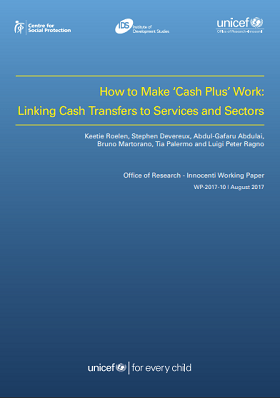
How to Make ‘Cash Plus’ Work: Linking Cash Transfers to Services and Sectors
Report
The broad-ranging benefits of cash transfers are now widely recognized. However, the evidence base highlights that they often fall short in achieving longer-term and second-order impacts related to nutrition, learning outcomes and morbidity.In recognition of these limitations, several ‘cash...

Madagascar Cash in Emergency Principles
Guidelines and Tools
To improve coordination at technical and strategic levels, an emergency cash group was formed in 2016 under the overall umbrella of the Social Protection Thematic Group which was co-led by UNICEF and the Ministry in charge of social protection. This has strengthened coordination amongst partners; improved...

Shock-Responsive Social Protection Systems Research Case Study: Pakistan
Report
This case study presents an overview of the social protection disaster risk management and humanitarian systems in Pakistan, and discusses both Pakistan’s flagship social protection programme, the Benazir Income Support Programme (BISP), as well as emergency cash transfers provided as disaster...
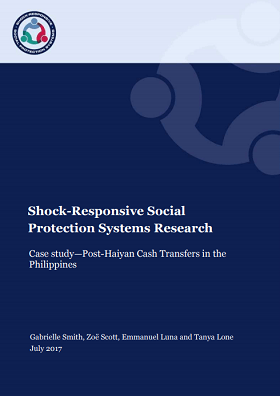
Shock-Responsive Social Protection Systems Research Case study—Post-Haiyan Cash Transfers in the Philippines
Report
This case study report focuses specifically on the experiences of using emergency cash transfers following Typhoon Haiyan and considers the wider social protection system, developments since Haiyan and future possibilities for shock-responsive social protection. A summary briefing note is published...

Challenging the System: Humanitarian Cash Transfers in Iraq
Report
Cash transfers have been used in Iraq to meet the critical basic needs of a highly vulnerable population, providing them dignity and flexibility in a context of uncertainty and economic need. Although Iraq is an appropriate context for the use of cash transfers, factors including government acceptance,...

Building on social protection systems for effective disaster response: the Pakistan experience
Report
How can social protection systems be used in disasters, as a complement to, or substitute for, humanitarian assistance? Oxford Policy Management (OPM) led a two-year research project investigating this question, looking at the role of social protection in both mitigating the impact of large-scale shocks...

